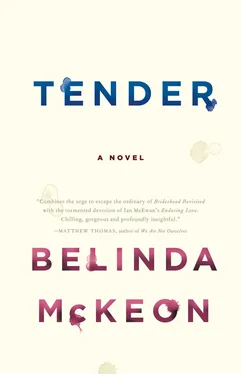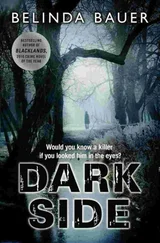And it was true, they were among the first people there; four or five people stood chatting in the center of the gallery floor, among them Dunne himself, recognizable from the photograph which had run beside the Irish Times piece. He would turn sixty later that year, the piece had said, and the journalist had described him as looking younger, but to Catherine he looked about that; he was bald, and wrinkled, and as tanned as if he lived in the Caribbean, and he wore a dark suit, the jacket of which had a closed collar coming right up to his neck, and bright blue glasses, the frames very round. In his hand he held a glass of champagne, as did the other people standing around him: a couple of gray-haired men, a woman in a tight red dress, a younger, dark-haired man in a more traditional suit and tie. As James and Catherine stood, frozen, at the entrance to the space, Dunne noticed them and beckoned them in.
“Oh, fuck, fuck, ” James hissed out of the side of his mouth.
“What should we do?”
“Come in, for Chrissakes!” the younger man exclaimed. He was American; he looked, Catherine thought, like a Kennedy. He came towards them now as they walked — shuffled — into the space, both blushing — how Catherine hated to see this in James; how she wished he, at least, had managed to look unflustered — and the American smiled, showing his white, straight teeth. He was, Catherine thought, thirty or thirty-five or something, with a high, clean forehead under his tight dark curls.
“Sorry we’re early,” Catherine said as they reached him.
He frowned. “You’re not early.”
“Sorry, sorry,” she blurted again.
He smirked. “Oh, I forgot that about you people. The apologizing.” He extended a hand. “I’m Nate,” he said. “I’m here with Ed. And you two?”
“We’re not,” Catherine said, ridiculously, immediately closing her eyes with the shame of it, so that she could not see the expression on Nate’s face as he reacted to this.
“We’re…” James said, seeming to cast about for a description. “We’re students. Art students. We heard about the exhibition through a contact.”
“Through a contact? ” Nate said, visibly smothering a laugh.
“Well, a friend, really,” James said hurriedly. “Another, you know, artist.”
“Hmm,” Nate said, nodding slowly. “You still haven’t told me your names.”
Seeming to have decided now to take charge, James stepped forward, his hand outstretched. “James Flynn,” he said briskly. “And this is Catherine Reilly.”
“Very formal,” Nate said; his handshake was firm. “So have you met Ed before?”
“Oh, no,” they said in unison. Catherine blinked rapidly.
“We’re just here to see the art, really,” she said, and she swept her gaze wildly around the gallery walls. “Looks great,” she said, and then, as though propelled, she lurched away from Nate and James and practically ran to the piece which was furthest away, right across the room, a huge photo of a red-bricked block of flats, clothing hanging from many of the balconies, the reflection of a sunset glinting in a swath of the windowpanes. She stood in front of it as though it was an actual building, and one to which she desperately needed to gain admittance; she stood there, clutching the strap of her new Oxfam evening bag, as though she was prepared to queue outside this building all night. Behind her, she could hear the sounds of Nate introducing James to Ed Dunne and the others: James’s Love your work, Dunne’s rote, bluffing professions of modesty, Nate’s loud, confident interrogations, and the polite laughter of the people around them, the people who had turned up first to this exhibition and yet seemed not to have any desire to look at the work.
Gradually, more people began to arrive, filling the gallery space, standing in front of the photographs. Whenever Catherine glanced around, James was still deep in conversation with Dunne and his group. In the pub he had expressed a determination to network at the opening, and she had encouraged him, telling him to make sure that people knew that he had a show coming up himself, but now she could not help but feel the sting of being abandoned by him like this. It was her own fault, she knew; if she had not fled the exchange with Nate like she had, she would presumably also be a part of that chatting, smiling cluster of people now. She was comforted by the thought that James could not talk to them all evening, but in the next moment it occurred to her that he was very capable of doing just that; of getting so caught up in the excitement and the stimulation of being in the middle of things that he could completely forget that she was waiting for him elsewhere in the room. She pushed the thought away, because it threatened to make her miserable, and because she had resolved not to be miserable tonight; she had resolved to be normal, and easygoing, and a friend. She fixed her attention on the photograph in front of which she was now standing: it was a scene shot by torchlight in what looked like a field; blades of grass were visible, yellow and bright in the beam against the darkness. In the Times article, Dunne had talked about these photos as “guilt-pieces,” works saturated with the consciousness of the place he had left behind thirty years previously.
Bovinia, NY, 19 June 1994, the piece was titled. Each piece corresponded to an atrocity which had happened in the North, to an event which had claimed a life or lives. 19 June 1994; Catherine tried to think, now, what had happened on that day. She would have been in school, third year; it had been the month, she realized, of her Junior Cert, which had happened at the same time as the World Cup about which the entire country had gone insane. There had been a mass shooting in a pub up there the evening of the first Ireland match, she remembered now; the IRA, or the UVF, or whichever of the bastards it was, had walked into a bar and murdered several men who had been just sitting there, watching the football. Had that been the date? It seemed likely, but then there had been so many dates. Any one month could have had twenty of them. It was incredible to think now that all of that might really be over, that in a room up there, right now, people were possibly finding a way to make it end. It had been around as long as she could remember — her grandmother and her mother gasping and clicking their tongues in sorrow and disbelief at the news on the radio; her father’s angry, downcast eyes. It had been always the choked, frightened air of the country, so Christ knew what it had been like actually to live up there, over the border; Catherine could not imagine. Her family had never even traveled there; it had simply always been a place to which you did not go. She thought of Liam; his father had a pub up there, she remembered him saying, though she could not remember in which town — Enniskillen or Armagh or Derry or one of those places; they were all the same, in honesty, to Catherine; they were all scary, forbidden places, the inhabitants of which she felt somehow in awe of. To live with that, and yet to get on with things — she simply could not imagine. Daddy, I love you very much, a dying girl at the scene of the Enniskillen bombing had said to her father, and Catherine, aged nine or ten then, had been unnerved and shaken by it, by the thought of a girl, her life about to be taken from her, having that much courage, that much thought for those who would mourn for her, to be able to say that to her father, to be able to speak those words.
She was growing morbid, she realized; she shook her head vigorously, to shake herself out of it, and moved on to the next photo. This one was of a young black girl sitting on what looked like a footpath; it was gray and stained and cracked. She wore denim dungarees, and red sandals, and her knees were scuffed. In her hand she held a bracelet made of brightly colored plastic balls. Atlantic Avenue, 8 May 1991, the piece was called. Her eyes were huge. From the top right-hand corner of the image, a hand reached down, its palm pale and deeply scored.
Читать дальше












